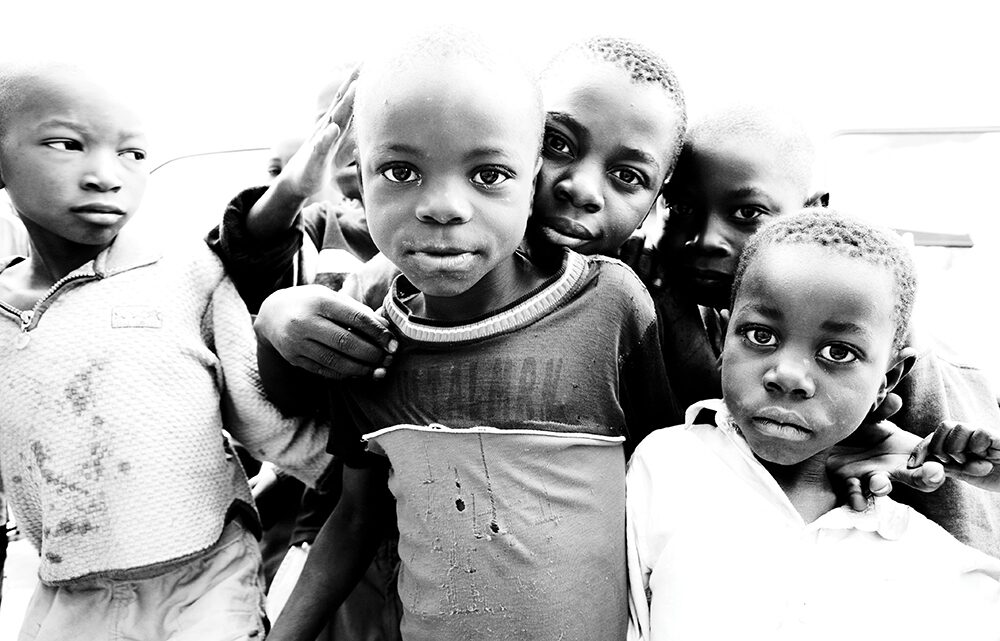
Departments
Profiles
Happy Soles
What does it take to change someone's life? For children in Uganda, change occurs one foot at a time with divinely inspired, upcycled shoes.
Smiles often chase tears in dusty Ugandan villages when Drü and Asher Collie show up. With patience and compassion, they wash children’s feet, remove parasitic sand fleas known as jiggers, dry tears and fit children with new shoes that protect them from reinfection.
“In Uganda, nobody is combating this problem,” says Asher, describing painful infections that often result in amputations and paralysis. “Some believe it’s caused by witchcraft. Many think there’s no hope for it. That hopelessness opens doors for us to share not just the hope of a jigger-free life, but also the hope of Jesus.”
With the help of a nurse and volunteers, the Collies regularly host jigger-removal and shoe-gifting clinics through Sole Hope, a nonprofit organization they founded three years ago. They also spray to eradicate the pests in schools and homes, and teach parents and caregivers how to remove jiggers—easy when the parasite is young—and how to care for wounds.
In early 2013, Drü and Asher left their home in Asheville, North Carolina, and moved with their three young children to Jinja in the Busoga region of Uganda. Busoga is the nation’s jigger capital.
A foot clinic is more than a smiling child. It’s changed lives, like that of a young girl whose feet were rotting from gangrene as 30 jiggers dug into her. Left untreated, she would have died. “A nurse and I removed the jiggers and treated her with antibiotics,” Asher says. “When we went back to check on her a week later, she had two new jiggers, which her mother removed while we watched. That was so rewarding, to see our educational efforts paying off.”
The Collies have a solid faith in Jesus and a desire to witness to others through their words and actions. “Drü and I firmly believe that whatever work we do as Christians should be a ministry to others, and that it should be done in the name of Jesus.”
A Doorway Beckons
A few years ago Drü and Asher were like many young couples pursuing the American dream. Drü was managing a chain of coffee stores and Asher was building her photography business and taking care of their young children. Committed, lifelong Christians—Asher’s father was a Navy chaplain and Drü’s parents were involved in overseas mission programs—the Collies have a heart for children in need. They have served as foster parents and were considering adopting an African child when Asher came across a YouTube video on jiggers and their devastating impact on children.
“At first I tried to close off my heart and prayed that someone else would care enough to do something about this,” she says. But as she read more about this problem half a world away, she knew the Lord had placed a burden on her for these children who couldn’t defend themselves against an almost invisible foe.
The more she learned online and during trips to Africa, the more she realized the solution was simple: closed toe shoes would protect children’s feet from jiggers. But knowing the answer and creating that solution were two different things. For six months she tried to design a durable shoe made from recycled materials, only to fail repeatedly. One day, she sat down with her son’s baby shoe and imagined what it would look like flattened into a pattern.
“I knew there was nothing in me that could do this, so I told the Lord, ‘This is completely YOU, God—because I have no idea what I’m doing.” She drew up a pattern, sewed it up and burst into tears. God had given Sole Hope a shoe.
Drü supported Asher’s efforts, but wasn’t fully on board until he visited Uganda and saw the problem up close for himself. “The turning point for me was doing my first jigger removal and holding the foot of a child who was the same age as my own,” he says. “Suddenly it made sense that somebody had to do something about this—and we were that somebody.”
With Drü fully committed, the couple and their supporters developed an international shoemaking process. Stateside, volunteers host shoe-cutting parties, gathering friends to recycle old blue jeans into shoe uppers. More than 2,000 parties have been held.
Shipped to Africa, the uppers are sewn and attached to soles made locally from recycled bicycle tires. Local tailors oversee Ugandan shoemakers, often widows and former sex workers.
“By making shoes, these individuals learn a trade and earn a sustainable income,” Asher says. “In many cases, they also begin to care about the jigger problem and develop a passion to help the people in their villages.”
This is Sole Hope’s goal: to inspire local people to care. “We’re not here as the muzungu, the white person who has come to fix a problem,” Drü says. “We’re here to educate, love and share hope.”
"They shall run and not be weary, they shall walk and not faint."
When God Calls
If God puts a burden on your heart, the Collies urge Christians to act on it. “Don’t wait to be ‘ready’ to obey,” Drü says. “Being ready is a myth. You can always have some excuse or something that gets in the way. But when it’s God’s timing, there’s no sense in waiting.” Asher adds, “Take God’s call seriously. He’ll reveal His perfect plan and His perfect time. In the meantime, don’t think little of prayer. It’s the greatest action you can take while you wait for God to prepare the way.”
Partnering with God has taken the couple and their children far from home, careers, family, comfort and convenience. Despite Africa’s fear-inspiring reputation, this young family is thriving. “Our children—Quinn, Asa and Silas—love Africa. Silas thinks he’s African,” Asher says. “If God is calling you out of your comfort zone—to another nation or down the street—take the risk. Seek what God has in store for your life. Don’t stay comfortable.
“As you obey, don’t diminish the results by thinking it’s not big enough or fast enough. That’s how we think in America,” Asher says. “I find myself constantly having to humble myself and think, ‘This is about this one child in front of me.’”
Drü agrees. “Our joy is seeing the face of the one we’re impacting. It starts with one home. If we can get one home jigger-free for six months, then spread out to 10 homes, wow. In the meantime, it’s the one in front of us that matters.”
The Collies started Sole Hope by investing their own time and money. They quickly attracted a group of experienced mentors and supporters who helped them get the organization established on a firm footing. Today, Sole Hope has an active board of directors and is registered in the United States as a 501(c)3 nonprofit organization.
What’s a Jigger?
Jiggers are parasitic fleas that burrow into bare feet. Left untreated, they lay hundreds of eggs, causing intense pain and secondary infections, often resulting in amputations and paralysis. They thrive in tropical and subtropical climates.
Ways You Can Help
Help with Sole Hope’s life-changing efforts by hosting a shoe-cutting party. Every pair of shoes made in Africa starts somewhere else in the world at a shoe-cutting party.
Sole Hope’s shoe party specialist Ashley Redburn oversees the effort. She and her husband adopted twin boys from Ethiopia who had jiggers in their feet. She’s hosted over 50 shoe-cutting parties.
“Anyone who can use scissors can cut shoes,” she says. “You can do this so easily while fellowshipping with other people.”
It’s a great activity for a Bible study group, Girl Scout troop or any small group. Parties may be just a few people or as many as 100.
To get started, you need a party-hosting kit, which includes shoe patterns, an instructional DVD, a booklet and lots of advice.
Guests are asked to bring scissors and old blue jeans. They also pay $10, which covers shipping, a shoemaker’s wage and supplies for sewing and foot clinics.
Order party kits at the Sole Hope website or support the ministry through a purchase of an Americanized version of the shoes.
Go to solehope.com.

John, who lives in the village of Wakisi, had over 30 jiggers removed from his feet. By wearing closed-toe shoes while playing and attending his dirt-floored school, John can avoid future jigger infections.







A Ugandan woman sews an upper that was cut in the United States at a shoe-cutting party. Currently 16 shoemakers earn a living sewing for Sole Hope. The Collies measure success in lives—from shoemakers to children—who have been touched by hope.
We want to keep in touch.
Don’t miss out on the latest Life:Beautiful updates, promotions and news.











